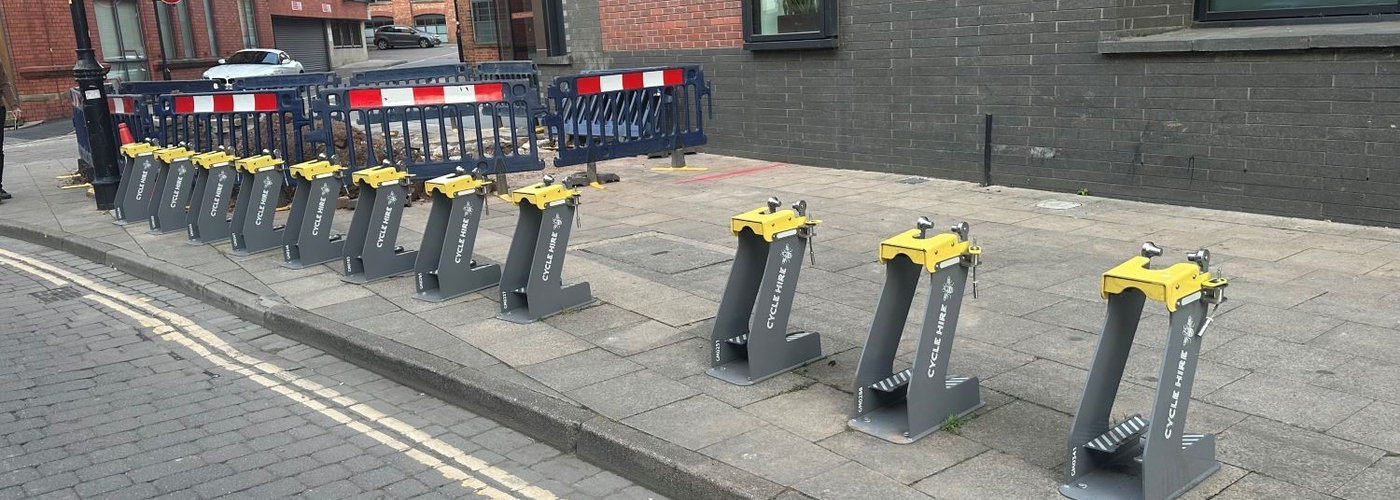Jonathan Schofield on the crisis for a Greater Manchester 'active travel' flagship
Over the last month or so bright yellow objects have been disappearing from the streets of Manchester, Trafford and Salford in alarming numbers. These yellow objects are a key component of the city region’s Bee Network, integrating public transport with cycling and walking.
The question is where have so many of the Beryl bikes gone?
The result is that one of the flagship Greater Manchester travel schemes is presently not fit for purpose
A positive ambition
The Beryl scheme began with a burst of optimism in November 2021 with a five-year budget of £16.96m, around £12m of which was to come from the Mayor's Challenge Fund.
Greater Manchester Mayor Andy Burnham spelt out the ambition to Confidentials.com in June 2021. “We’re fully integrating our public transport system – The Bee Network – and building the UK’s largest cycling and walking network. Our cycle hire will be one of the largest docked systems outside London and I cannot wait to use the new bikes myself as a way to get from A to B. We’re making huge strides towards our plans to build back greener and be carbon neutral by 2038.”
All the boxes ticked then, an environmental booster and greater opportunity for Greater Mancunians to get fitter by jumping on a hire bike. Access was, and remains, easy through an app and card payments.
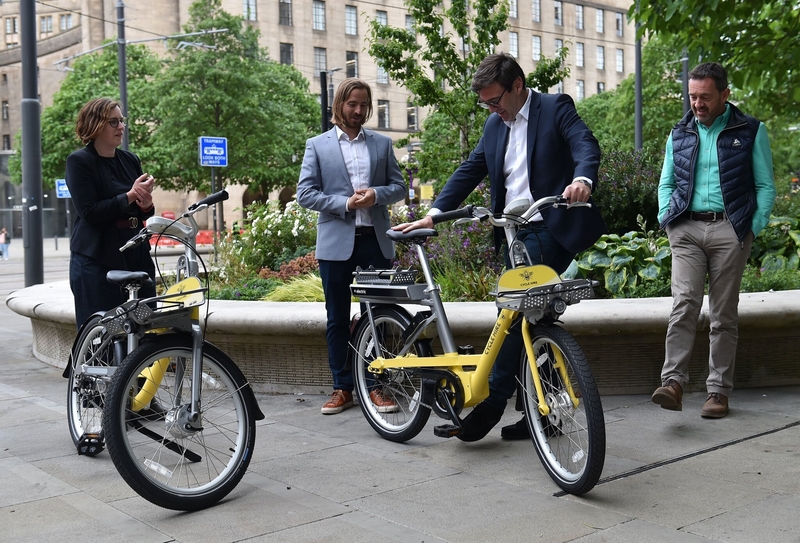
Mobike hangovers
If there was a shadow over the scheme it was the failure of the Mobike cycle system which fled Manchester in 2018.
As Lucy Tomlinson wrote in Confidentials.com in 2021, when the news of the Beryl bikes scheme was launched: ‘Many commenters (have) responded by pointing to the Mobike fiasco, in which the Chinese dockless bike firm withdrew from Manchester due to constant vandalism.
‘Beryl's docking system is designed to counteract this, as the user has to keep paying for the bike until it is re-docked, theoretically discouraging people from chucking it in a canal or hanging them from a tree, or other creative methods of disposal. This assumes, of course, people who want to chuck bikes in canals also set up accounts in their own names with their own cards.’
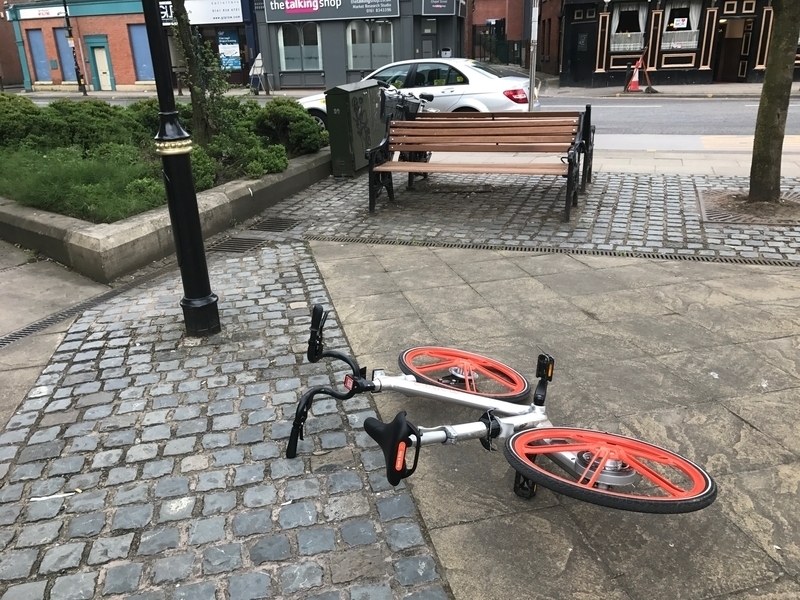
More positivity and big numbers
I interviewed Phil Ellis, CEO of Beryl bikes and Ian Baxter, the Scheme Manager for Transport for Greater Manchester (TfGM), in May. We discussed general principles of the Beryl bike scheme rather than the recent disappearances but we touched on relevant subjects.
Ellis told me how the scheme was run.
“In many of our schemes we own the system,” he said, “Beryl own the system and deliver the service on behalf of the local authority. In Greater Manchester that's not the case. TfGM owns the system. TfGM delivers the journeys. Everybody who is a customer of the bikes is a customer of TfGM. We're really there to deliver that and lend our experience and build the system and the products and the technology that we've had from elsewhere, but we're doing it on behalf of TfGM. From a commercial point of view, that's a pretty common approach to the big mayoral cities. So that contractual approach is how London works, it's how the West Midlands works, it's how Greater Manchester works.”
Baxter was positive about take-up of the scheme.
“We've seen usage numbers that have been really good in terms of what we predicted, what we expected," he said. "We've got over 50,000 active users already joined. We've surpassed 300,000 rides in total and we're getting around about 1,200, 1,500 rides a day at the moment, which is really good to see. And just one final stat that I think helps compare with other schemes. Since the start we've got one and a half rides per bike a day so every bike that's out there is statistically ridden more than once a day which is fantastic to see.”
Since then things have clearly taken a turn for the worse.
The rides must be way down as there are so few bikes to hire.
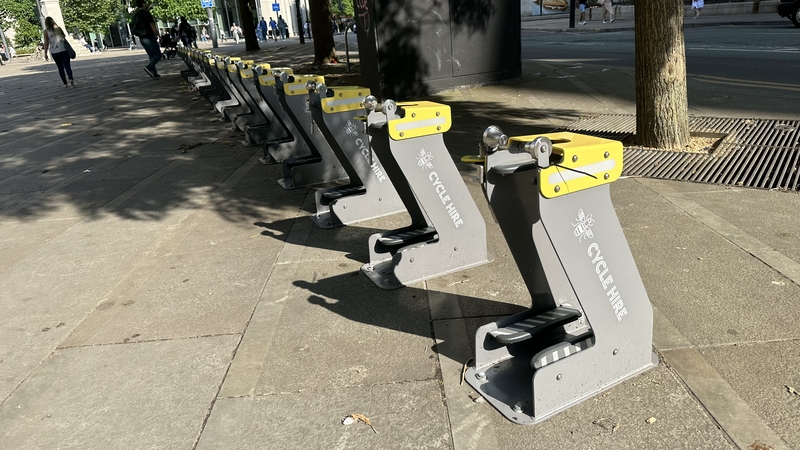
Personal experience of a declining service
I use Beryl bikes constantly.
They are easier to hire and ride than any other bike scheme I’ve used in the UK and Europe. It’s less straightforward docking the bikes back at the stations and ensuring you don’t carry on paying, but generally it’s a great system. As a writer and a tourist professional in Manchester it's been a fabulous way to quickly get from Castlefield to Ancoats, from the University to the Quays and so on.
Then several weeks ago the number of bikes available for hire started to reduce. It's now become a real problem.
On the evening of the 22 June there were almost no bikes at stations in many areas. The image below shows the app availability at 10pm. There were two bikes available along the whole west of Manchester centre and there were a couple over the River Irwell in Salford. Some bikes were not docked at stations at all which, in my experience, means the public can’t hire them.
So, that lack of availability is good, yes? Everybody must be pootling round on them?
Nope, it means there are scarcely any bikes to hire.
Questions asked, half answers back
Confidentials.com asked Beryl and TfGM what was happening to the bikes by email on 12 June, received a response and asked for clarification on 15 June.
We’d asked these questions among others: Please explain the statement about 'a recent spate of vandalism' (in your email of 12 June) and when this started and how this is different from other months in scale? How many bikes are presently available in the Manchester scheme? Is there a timeframe for when the situation may improve with regard to the very small number of bikes available?
There was a whiff of anxiety by way of explaining the delays to these questions but on 20 June we received an emailed response from TfGM.
‘We’re not in a position to provide the figures you requested regarding cycle hire bikes,’ it said. This was followed by a message from TfGM’s Active Travel Programme Director, Richard Nickson.
“The Greater Manchester Cycle Hire Scheme,” Nickson says, “has been hugely popular so far, with almost one million kilometres ridden since its launch, and the majority of people are using the bikes as they should.
“Unfortunately, a recent spate of vandalism has meant that fewer bikes are available than normal and we would like to apologise to anyone that has recently been unable to access one.
“TfGM owns and manages the scheme, which is operated by Beryl, and we are working together to restore the availability of bikes as soon as possible.
“The increase in vandalism has resulted in a backlog of bikes in need of repair in the Trafford depot, as well as those in need of routine maintenance. Beryl has increased depot resources to speed up bike repairs and get them back out on the network for people to use.
“In addition, we have been experiencing increasingly high demand for our bikes, with usage around three times higher than expected, and following the opening of thirty new stations in the last month in Trafford and Manchester city centre we are also seeing a change in how they are being used.
“We would appeal to the small minority of people are misusing the bikes to please respect them and help us ensure our bikes remain available for other people to use.
“TfGM is working closely with Greater Manchester Police through the TravelSafe Partnership to minimise incidents of vandalism, theft and anti-social behaviour.”
No specific answers there and the message ends with an appeal to bike abusers to stop and be nice.
Vandalism and Beryl bikes
I’d asked about vandalism in that first interview in May.
Iain Baxter of TfGM had said; “We have got incidents of anti-social behaviour (ASB). We're seeing vandalism and bikes that do get stolen. Beryl have a tracker on the bikes so they retrieve bikes on a regular basis. Most bikes that go missing are retrieved relatively quickly. So that's just an ongoing thing. I think at the moment we're still in the early days of cycle hire in Manchester for us and really we're avoiding making too many comparisons yet with anything. We really need to get a year or two’s worth of usage under our belts before we start looking at those trends because they're not trends yet they're just numbers.”
I asked, “Are you disappointed by it or just expected it?”
Baxter again: “I think we expected a certain level of ASB. I think at the moment we're seeing higher levels of antisocial behaviour and vandalism around holidays and we've got this little period now, we've got a few bank holidays that are all happening. So, we're going to see a little bit of an uplift there, I think. But we're waiting to get a full year of operation under our belts to really make those comparisons and start looking at it in more detail.”
Phil Ellis added: “Your first 24 hours are crucial and your chances of recovering the bike diminish over time. So really there's three things: obviously the design of the bike and the system, there's technology in tracking the bike and there's the operational service in recovering the bike.
“The overall system has to constantly almost stay one step ahead of those who are trying to vandalise the scheme or at least stay in step with them,” Ellis continues. “So it's a big part of any bike share system in the UK and any system. I think, speaking to colleagues within the industry across Europe, for whatever reason, it is worse in the UK than it is in other countries. But it's not a Manchester differential, it's just a challenge that we face, and a challenge that we always knew we were going to face.”
“So, we're not worse than other cities in the UK?” I asked.
Ellis replied with: “No, I wouldn't say so. Not to comparable cities.”
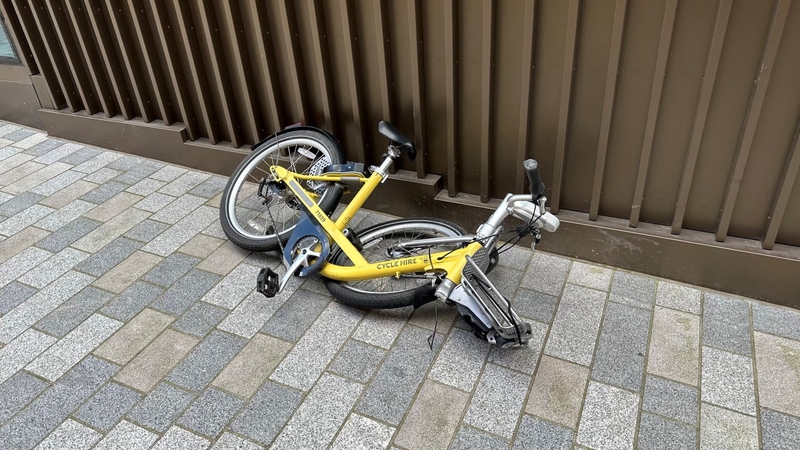
Straight answers please and timeframes
That May interview had ended on a positive note with Baxter saying: “At the moment we're operating with between 800 and 1000 bikes for 2000 stands. And by the end of the month we will have our full capacity of stands to go, in theory, to the 1,500 bikes that we're targeting.”
It turns out that was way off the mark.
The reverse has happened. At 7.30am on 23 June the Beryl app showed total bikes for hire at docking stations across the whole system as fewer than 175.
The result is that one of the flagship Greater Manchester travel schemes is presently not fit for purpose.
Lobby group Walk Ride GM, an influential campaigning organisation, who have been cosy with Andy Burnham and of TfGM, has publicly called for ‘an urgent review into the cycle hire scheme’ by Burnham and TfGM.
TfGM and all sensible Greater Manchester citizens want an integrated London-style transport system joining together rail, buses, trams, cycling and walking. We want Burnham’s Bee Network, but as Walk Ride GM have tweeted, “The Bee Network cannot continue sustainably without a workable cycle hire scheme.” The group is right.
A little more clarity from TfGM would be reassuring at this point since they own the system. Mealy-mouthed responses with no timeframes aren’t good enough, nor are glowing comments about the scheme being 'hugely popular' and usage three times more than expected, when there are presently so few bikes available.
TfGM had an opportunity to say on 20 June that the backlog will be cleared by the end of July or September or within a given timeframe. They could have turned a light on for us, as a public body, rather than saying 'we're not in position to provide the figures you requested'. Why can’t TfGM count how many bikes are out there, how many bikes are being repaired and how many bikes have been lost to theft or damage and just tell us?
Media channels should not have to reach for the Freedom of Information Act to get straightforward responses.
Other questions are beginning to need answers. Have repair and recovery systems been adequately resourced? Was the contract tight enough with Beryl? Or are TfGM really trying to hint the scheme has been a victin of its own success?
What’s clear is that, as with the Mobike scheme, there are problems with Beryl bikes. We want this scheme to succeed, the city region probably needs it to succeed in terms of reputation and carrying forward its Bee Network plans. It would have been great for the system to be working fully in time for the start of Manchester International Festival on 29 June. That doesn't look remotely likely.
What is also clear is that if Beryl bikes go the way of Mobikes then which operator will want to set up a new scheme in Manchester? Let’s hope these issues are temporary, a comma not a full stop.
At the moment for Beryl bikes the wheels have come off.
Get the latest news to your inbox
Get the latest food & drink news and exclusive offers by email by signing up to our mailing list. This is one of the ways that Confidentials remains free to our readers and by signing up you help support our high quality, impartial and knowledgable writers. Thank you!






